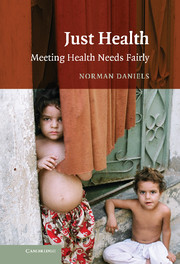8 - Medical Professionalism and the Care We Should Get
Published online by Cambridge University Press: 05 June 2012
Summary
Is medical professionalism compatible with the requirements of justice for population health and fair treatment within a health system? In this chapter I explore selected aspects of this question, focusing in particular on two issues that pose the potential conflict in a very sharp form. Can physicians reconcile their professional obligations to an individual patient under treatment with the fair treatment of all patients? Do physicians owe treatment to people in need even when they face great risk to themselves, or are professional obligations more limited? (Despite the importance of nurses in delivering care to patients, I shall focus on physicians because of their primary role in determining what services are to be delivered.)
Both questions arose as actual challenges because of events and policies in the past two decades. During the late 1980s and early 1990s, fearing contagion from patients with human immunodeficiency virus/acquired immune deficiency syndrome (HIV/AIDS), medical professionals questioned their obligation to face such risks. The issue arose even more dramatically a decade later when the severe acute respiratory syndrome (SARS) epidemic infected health workers in several countries at an alarming rate. Refusals to treat obviously lead to problems of access to care, both for very sick individuals and for a public facing an epidemic. What does medical professionalism require, and is it compatible with what our account says justice requires?
- Type
- Chapter
- Information
- Just HealthMeeting Health Needs Fairly, pp. 218 - 240Publisher: Cambridge University PressPrint publication year: 2007



